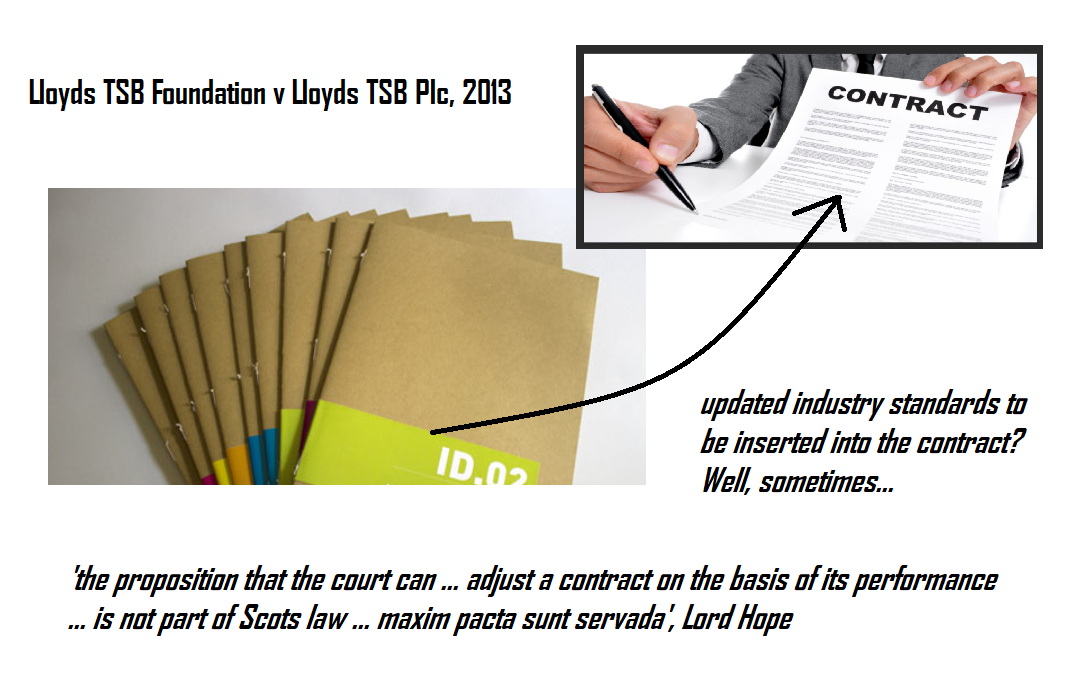Lloyds TSB Foundation for Scotland v Lloyds Banking Group Plc (Scotland) [2013] UKSC 3 (23 January 2013)
Citation:Lloyds TSB Foundation for Scotland v Lloyds Banking Group Plc (Scotland) [2013] UKSC 3 (23 January 2013)
Rule of thumb:Where there is a long term contract in place, is the organisation supposed to keep up with modern standards in the provision of goods & services, or, is it the standard at the time when the contract was agreed? Parties are generally expected to keep up with updating practice standards under contract, but not where these would fundamentally alter the obligations under the contract.
Background facts:
The facts of this case were that Lloyds charitable foundation had an agreement with Lloyds Banking Group where Lloyds Banking Group would pay a percentage of their profits to the charity. The case boiled down to the fact that accounting standards had changed from when the contract was first agreed as compared to a later date – accounting law essentially changed significantly and this caused companies to have to declare bigger profits than they had to previously. Under the old accounting method Lloyd Bank had to pay the charity £38,000 and under the new accounting method Lloyds had to pay 3.5 million.
Parties argued:
The foundation argued that it was an implied term of the contract that the other party had to keep up to date with newly introduced legal standards in their trade, and with the new accounting legal standards they were entitled to this money, thereby meaning the Lloyds bank owed them 3.5 million. Lloyds the bank argued that this was a change in standard that fundamentally altered the performance expected of them meaning that this update in practice standards did not apply.
Judgment:
The Court upheld the arguments of Lloyds the Bank and did not accept those submitted by Lloyds Charity. Although it was accepted that under contract the party providing the goods/service etc is expected to comply with general updates in legal practice standards as an implied term of the contract, these do not apply if these practice standards fundamentally alter the performance expected of the party. The Court affirmed that the principle of fundamental contractual performance applied to this matter. The Court held that where the performance would be wholly changed by an update in technical legal standards in the trade then these do not apply to the contract. The Court reasoned that they do not have the power to effectively wholly rewrite contracts like this, indeed referring to 'the agreements must be kept' 'maxim pacta sunt servada' principle, with people not being entitled to greater performance than the one they agreed the contract for, which is one of the overarching purposes of contract law. The Charity was only entitled to £38,000 rather than £3.5 million.

Ratio-decidendi:
‘For all these reasons I would hold that the proposition that the court can equitably adjust a contract on the basis that its performance, while not frustrated, is no longer that which was originally contemplated is not part of Scots law. To hold otherwise would be to undermine the principle enshrined in the maxim pacta sunt servanda which lies at the root of the whole of the law of contract. I see no need for this and, as there is no need for it, I would reject the suggestion that the court should assume that function’, Lord Hope
'the proposition that the court can ... adjust a contract on the basis of its performance ... is not part of Scots law ... maxim pacta sunt servada', Lord Hope.
Warning: This is not professional legal advice. This is not professional legal education advice. Please obtain professional guidance before embarking on any legal course of action. This is just an interpretation of a Judgment by persons of legal insight & varying levels of legal specialism, experience & expertise. Please read the Judgment yourself and form your own interpretation of it with professional assistance.

